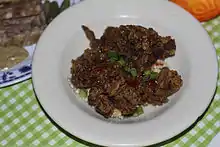Pepper jelly
Pepper jelly is a preserve made with peppers, sugar, and salt in a pectin or vinegar base. The product, which rose in popularity in the United States from the 1980s to mid-1990s,[1] can be described as a piquant mix of sweetness and heat, and is used for meats and as an ingredient in various food preparations.[2] It can be put in sandwiches, or served on cream cheese for a cracker spread[2] or used to make a pepper jelly cheesecake.[3][4]
.jpg.webp) Jars of red pepper jelly | |
| Course | Condiment |
|---|---|
| Main ingredients | Chili peppers, sugar and salt, pectin or vinegar |
History
Pepper jelly's history starts in Lake Jackson, Texas. The first dates for commercial sale start around the late 1970s. The original recipes for pepper jelly were likely to be with jalapeno peppers. [5]

Preparation
The more common preparation of pepper jelly is with jalapenos, bell peppers, pectin, sugar, vinegar, and often times wine or liqueur. [6]
There have been taste test to observe which pepper combination is most popular and desirable. The peppers looked at were Habanero, Cheiro do Norte, Biquinho, Malagueta, Cayenne, Paprika and Dedo de Moça. The study concluded that less pungent peppers (Biquinho, Paprika and Cheiro do Norte) were the most suitable for making jelly due to the reddish color, characteristic flavor and aroma of a pepper, sweet taste, and low pungency.[7]
See also
References
- "Google books ngram viewer".
- King, Terry Johnson. "This pepper jelly is real hot stuff". The Miami News. Retrieved 8 November 2015.
- "Pepper jelly is fascinating to make". thestar.com. Retrieved 8 November 2015.
- "Hot Pepper Jelly Cheesecake". post-gazette.com. Retrieved 8 November 2015.
- "About Pepper Jelly". ifood.tv. Retrieved 2020-10-12.
- Byrn, Anne (2018-03-19). "It's springtime in the South -- let's make hot pepper jelly". Southern Kitchen. Retrieved 2020-10-12.
- Almeida Alves, Jéssica; Nogueira Curi, Paula; Pio, Rafael; dos Santos Penoni, Edwaldo; Pasqual, Moacir; Rios de Souza, Vanessa (2019-02-01). "Characterization, processing potential and drivers for preference of pepper cultivars in the production of sweet or spicy jellies". Journal of Food Science and Technology. 56 (2): 624–633. doi:10.1007/s13197-018-3517-z. ISSN 0975-8402. PMC 6400772. PMID 30906020.
